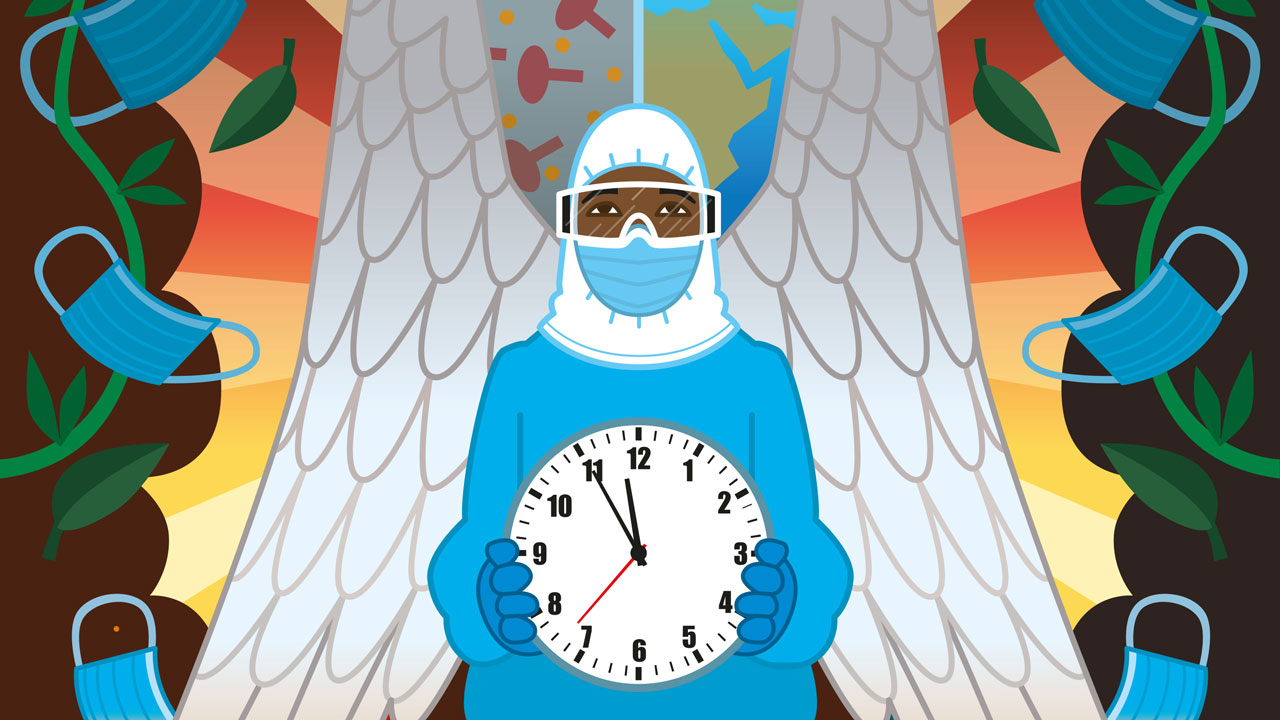Before the release of Marillion’s last album, FEAR (Fuck Everyone And Run), Steve Hogarth expressed despair at self-serving attitudes on the rise, even before Brexit and Trump loomed into view: “I have a feeling that we’re approaching some kind of sea change in the world – an irreversible political, financial, humanitarian and environmental storm. I hope that I’m wrong.”
Obviously no one really foresaw the events of the past two years, but the response to it among individuals as well as governments has arguably confirmed Marillion’s world view. Nearly six years later, it’s fair to say things aren’t looking any rosier. And Hogarth’s unease has evolved into something faintly pre-apocalyptic, if FEAR’s follow-up is anything to go by.
An Hour Before It’s Dark takes its title and central theme from the feeling that there’s a clock ticking ever louder as people squabble over the fundamental right not to get a needle pricked in their arms or reduce their carbon footprint. And from the very start of the album, Marillion sound determined to grab the listener by the lapels.
Be Hard On Yourself is based around an intriguing central lyrical idea, which seems to contradict the prevailing wisdom that we need to #bekind to ourselves in these trying times. Hogarth might agree up to a point, but ultimately he’s appealing to us to make sacrifices for the sake of our fellow humans because ‘You’ve been spoiled for year’ and, as he warns towards the climax, ‘We haven’t got long… til the end of this song.’
Messrs Rothery, Kelly, Trewavas and Mosley drive home the point, with an earworm of an anthemic chorus, before the tempo picks up in the final minutes and the urgency spirals as if to confirm his words, a mad dash before the listener bursts suddenly out into the open air and the band falls away, as Hogarth breathessly gasps, ‘We’ve got an hour before it’s dark.’
But the sentiments aren’t just about altruism – Hogarth is admitting that self-interest and fear of our own futures are tied up in it too, as Reprogram The Gene confirms. ‘I don’t want to be food for the trees,’ he roars defiantly, referring to ‘Greta T’ alongside a situation, which ‘begins with the letter C’ where ‘the cure’s coming at us, the cure is the disease’. Is he saying the pandemic might just prove a wake-up call to address other, more long-term global issues? That’s in the ear of the beholder.
A further irony that will probably stick more firmly in most fans’ heads comes in the epic chorus of Murder Machines, where Hogarth sings ‘I put my arms around her, and I killed her with love’, which seems as good a summary as any of the heartbreaking feeling of passing on a deadly virus that many might have felt over the past two years.
If that’s the emotional peak of the record, the album’s second half initially seems like a bit of a comedown in comparison, as The Crown And The Nightingale and Sierra Leone don’t grab the attention quite so readily. The arena rock swell begins to plateau and drift, while the lyrics are more wreathed in symbolism, as in the latter song’s tale of finding a diamond in a rubbish heap and resolving not to sell it.
There’s a more incisive edge to the 15-minute closing track, as Care sets fears of our own mortality against the overarching theme of a planet facing a race to avert disaster. ‘Who knows how much time they’ve got left?’ Hogarth asks, and his point is reinforced more dynamically as swampy funk-infused basslines add to the sense of mild panic. That in turn only enhances the impact when a full-fat Rothery guitar line, borne on the wings of a mighty orchestral rock storm, swoops out of nowhere, before it plunges back into murky self-doubt. These are breathtaking moments, benefitting from sonic contrasts that weren’t quite so arresting in the preceding tracks.
Hogarth references previous lyrics on the album, including the title, as if elements of our journey are flashing before us as we prepare for the final curtain. But this time, either side of recalling once more how ‘she wrapped her arms around me’ a celestial choir envelopes us and our hero seems to be revitalised with an important earthly realisation: ‘The angels of this world are not in the walls of churches… The heroes in this world, working while we’re all sleeping.’ The ones who’ve been a little harder on themselves, perhaps?
And finally, a relatively happy ending is delivered. ‘An angel here on Earth came down here to carry me home,’ sings Hogarth at the track’s close. It’s a soothing, redemptive ending to an album full of anxiety and uncertainty. But within it all is a stirring and timely message. And there’s plenty of powerful sounds herein to keep us listening to it, for however much time we’ve got left.

